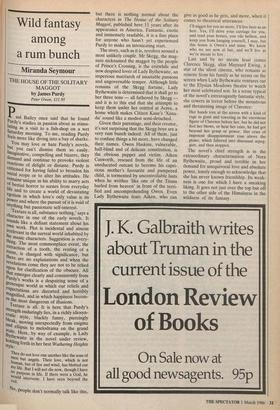Wild fantasy among a rum bunch
Miranda Seymour
THE HOUSE OF THE SOLITARY MAGGOT by James Purdy
Peter Owen, £11.95
Paul Bailey once said that he found Purdy's studies in passion about as stimu- lating as a visit to a fish-shop on a wet Saturday morning. To me, reading Purdy feels more like diving into a bay of sharks. You may love or hate Purdy's novels, but you can't dismiss them so easily. Imaginative, compelling and bizarre, they demand and continue to provoke violent reactions of delight or distaste. Purdy is criticised for having failed to broaden his social scope or to alter his attitudes. He remains- unique in his ability to marry acts Of bestial horror to scenes from everyday life and to create a world of devastating egotism in which love's only value is its Power and where the pursuit of it is void of anything but passionate self-interest. 7exture is all, substance nothing,' says a character in one of the early novels. It sounds like a defiant statement about his 9vvn work. Plot is incidental and almost irrelevant in the surreal world inhabited by his manic characters. Suggestion is every-
thing. The most commonplace event, the
extraction of a tooth, the renting of a room, is charged with significance, but there are no explanations and when the revelations come they are not to be relied upon for clarification of the obscure. All that emerges clearly and consistently from Purdy's works is a despairing sense of a grotesque world in which our reliefs and expectations are distorted and horribly Magnified, and in which happiness becom- es the most dangerous of illusions. Texture is all. It is here that Purdy's strength enduringly lies, in a richly idiosyn- cratic style, blackly funny, piercingly bleak, moving unexpectedly from enigma and ellipsis to melodrama on the grand scale, Here, by way of example, is Lady
holding in the novel under review,
nolding forth in her best Wuthering Heights style:
They do not love one another like the sons of men but angels. Their love, which is not human, but of fire and wind, has blotted out my life. But I will not die now, though I have no Purpose in life. If there were a God, he would intervene. I have seen beyond the veil, No, people don't normally talk like this,
but there is nothing normal about the characters in The House of the Solitary Maggot, published here 11 years after its appearance in America. Fantastic, exotic and immensely readable, it is a fine place for anyone who hasn't yet experienced Purdy to make an intoxicating start.
The story, such as it is, revolves around a most unlikely couple. Mr Skegg, the mag- nate nicknamed the maggot by the people of Prince's Crossing, is the erstwhile and now despised lover of Lady Bythewaite, an imperious matriarch of insatiable passions and ungovernable temper. Although little remains of the Skegg fortune, Lady Bythewaite is determined that it shall go to her three sons — all fathered by Skegg and it is to this end that she attempts to keep them under her control at Acres, a home which makes Citizen Kane's `Xana- du' sound like a modest semi-detached.
Given their parentage, and their creator, it's not surprising that the Skegg boys are a very rum bunch indeed. All of them, just to confuse things a bit more, have changed their names. Owen Haskins, vulnerable, half-blind and of delicate constitution, is the obvious puppet and victim. Aiken Cusworth, rescued from the life of an uneducated outcast to become his capri- cious mother's favourite and pampered child, is tormented by uncontrollable lusts when he writhes 'like one of the Titans hurled from heaven' in front of the terri- fied and uncomprehending Owen. Even Lady Bythewaite fears Aiken, who can give as good as he gets, and more, when it comes to theatrical utterances: I'll nigger for you no more. I'll live here as an heir. Yes, I'll drive your carriage for you, and tend your horses, you vile hellion, and keep you from hanging yourself, I may, but this house is Owen's and mine. We know who we are now at last, and we'll live as we're meant to live . . .
Last and by no means least comes Clarence Skegg, alias Maynard Ewing, a star of the silent cinema, who remains as remote from his family as he seems on the screen when Lady Bythewaite ventures out to the Elysian Meadows theatre to watch her most celebrated son. In a scene typical of the novel's extravagantly fantastic style, she cowers in terror before the monstrous and threatening image of Clarence: Her hands tore at the screen with a kind of rage as giant and towering as the enormous figure of Clarence before her, but he did not feel her blows, or hear her cries, he had got beyond her grasp or power. Her cries of impotent disappointment rose above the piano, which faltered into dissonant arpeg- gios, and then stopped.
The novel's chief strength is in the extraordinary characterisation of Nora Bythewaite, proud and terrible in her demand for unequivocal love and absolute power, lonely enough to acknowledge that she has never known friendship. Its weak- ness is one for which I have a sneaking liking. It goes not just over the top but off to the other side of the Himalayas in the wildness of its fantasy.














































 Previous page
Previous page